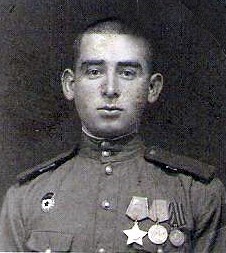Samuil Rozenberg was born in 1923 in Pohost Zahorodzki, Polish Polesia (now in Belarus). His father, grandfather, and four paternal uncles were fishermen, who leased the use of a lake from a local Polish estate-owner. In 1939 Samuil graduated from a Polish school. In September of that year, acting in the wake of the Ribbentrop-Molotov agreement, the Soviet Union annexed this part of Poland. The Soviets nationalized the fisheries owned by the Rozenbergs and classified the family as exploiters. In June 1941, a week before the Soviet-German war started, the large family of Rozenberg family was deported by the Soviet authorities to the Altai area, in Siberia. However, the prospect of deportations did not intimidate Grandfather Rozenberg. According to Samuil, his grandfather shouted at the crowd that had gathered around the deportation train and was hailing the expulsion of the "capitalist exploiters," "Some day you will envy us!"[1]
The war began on the very day that the deportation train left the town of Pinsk in Polesia. When the Rozenbergs arrived in the Altai area, they were sent to cut down trees. The labor was hard, but the food supply was inadequate, so Samuil and his relatives might well have died there. However, their Polish citizenship saved their lives. Since Samuil's father and grandfather hated the Soviet regime, and had refused to accept Soviet citizenship in 1940, legally they remained Poles. According to the Polish-Soviet agreement of 1941 all Polish citizens interned by the Soviets were to be released. Thus, the Rozenbergs were freed and allowed to move to Soviet Central Asia.
In mid-1943 the Soviet authorities assembled all such "Poles" (including many Jewish ones) in Central Asia and sent them to central Russia, where a new Polish army, the pro-Soviet Polish People's Army commanded by Zygmunt Berling, was being formed. (This military formation should not be confused with the army of Władysław Anders, that was established in 1941 and 42 in the Urals and then fought in the Western Theater). Samuil Rozenberg recalled as follows his experience at the enlistment office of the pro-Soviet Polish division:
"The six men of our family traveled [to the Moscow area] in a large group of about hundred people. […] We arrived in the Moscow area, where a reserve regiment of the Polish Army was stationed. All of us were sent to the [enlistment] commission. The ethnic Poles were immediately enlisted but we Jews were made to move aside and told to wait.
A Pole in uniform with the rank of major was sitting at a table. He said directly to us: 'This is the Polish army here and not a Jewish army. In any case, there are a lot of your kin here, people of your kin are all around here… just yours. Wherever you spit, you hit a Jew ... I'm not taking you. Go home. You will receive your documents in the office'... So, we returned to our village, and then we went to Khorezm [in Central Asia]. In June 1944, we were again summoned to the enlistment office, but this time to be drafted into the Red Army. Apparently, the total ban on the enlistment of "Westerners" from Belarus and Ukraine had been canceled…"
Samuil's military training lasted less than a month. From Central Asia his unit of 1,300 men was sent to Estonia and attached to the 291st Rifle Division. Samuil's uncle Osher asked the commander to include all the Rozenbergs in the same company of the same regiment, but the commander deliberately distributed them among various units (the Rozenbergs did not know that there was an order prohibiting the inclusion of close relatives in the same company). After a reconnaissance course, Samuil was transferred to the North, to the border with Norway – only to be transferred again, within a short time, to Poland. There, in January of 1945, Samuil had his baptism by fire. He went on many reconnaissance missions and, a number of times, captured German soldiers to obtain information from them.
Samuil's unit met VE-Day in Czechoslovakia. However, the war did not end for him on May 8, 1945. For the three following days, his unit had to fight SS units in the Czech mountains that had refused to lay down their weapons.
Among six members of the Rozenberg family from Pohost Zahorodzki, one (Uncle Aharon) was killed and four were wounded. Only Samuil went through the war unscathed.
Samuil's parents repatriated to Poland and sent him papers certifying that he had been born as a Polish citizen and, hence, was also eligible for repatriation. In 1945 or 1946, he was allowed into Poland, where he was reunited with his parents and brothers. All of them took part in the brikha (the Hebrew term for the illegal immigration of Jews to British-held Palestine via Germany, Austria, and Italy.) In 1947 they headed toward the Land of Israel, but their ship was intercepted by the British and Samuil was interned for a short time at Cyprus. He succeeded in reaching Israel only in 1948.
From an interview given by Samuil Rozenberg
Question: "How did the 'Westerners', [I mean] specifically the members of your family, view conscription?
Answer: "None of us tried to evade being drafted. It was one thing that my grandfather, father, and father's brothers regarded Stalin as a bandit, a villain, and their personal enemy, but another that we wanted to fight the Germans and at least, to some degree avenge our people.
[…]
We were drafted, six people from our family: me, my brother Itzhak, my cousin Moyshe, and my three uncles, Moyshe, Osher, and Aron, and this issue was not even discussed among us, whether we should go to war or not. We had been called to arms and, therefore, we had to serve. We accepted this as a matter of fact, especially since we had previously been 'sent to the front' -- in the Polish army."







